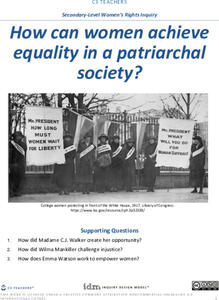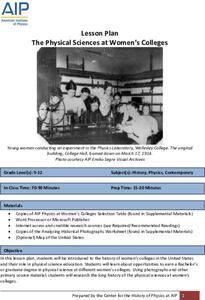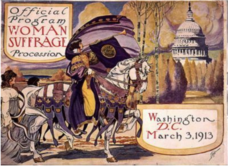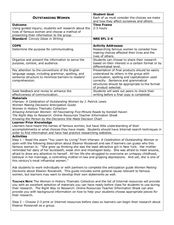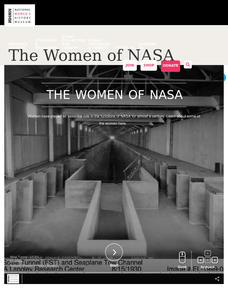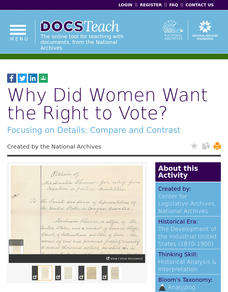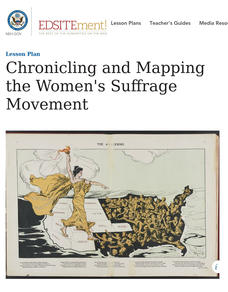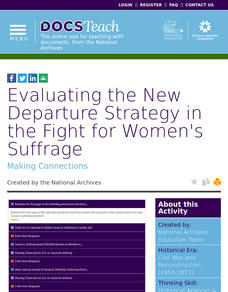C3 Teachers
Women’s Rights: How Can Women Achieve Equality in a Patriarchal Society?
Women today may not have heard of Madame C.J. Walker or Wilma Mankiller, and a few may not be aware of Emma Watson's current role; however, they have certainly benefited from their efforts. Using questions supplied by this guided...
C3 Teachers
Call for Change: What Did It Take for Women to Be Considered “Equal” to Men in New York?
An inquiry-based lesson challenges fourth graders to examine who had voting rights in New York when it was founded, women's roles, and how they entered politics. Scholars participate in thoughtful discussions and show what they know...
American Institute of Physics
The Physical Sciences at Women's Colleges
After a brief introduction to the history of women's colleges in the United States and a discussion of the resistance such institutions faced, young scientists investigate seven traditionally women's colleges and their physics programs....
American Institute of Physics
Women and the Manhattan Project
The Manhattan Project was a massive undertaking involving multiple sites and thousands of scientists and technicians. To gain an understanding of the women who participated in the project, groups select an oral history of a woman...
Gilder Lehrman Institute of American History
Women Abolitionists
Students examine the role of women abolitionists during the Civil War. Using essays and biographies, they try to identify the race and class of the different women activists and determine the expectations of the genders during this time....
Gilder Lehrman Institute of American History
A Different Perspective on Slavery: Writing the History of African American Enslaved Women
High schoolers examine the experiences of African-American women during the Civil War. Reading letters and autobiographies, they gain insight into how they dealt with slavery and losing their children. They create a model to evaluate the...
Curated OER
The Women’s Suffrage Movement
A set of lessons about the women's suffrage movement will bring history to life for your middle schoolers. Learners study primary documents, learn about famous suffragettes, and compare the suffrage movement to current events...
National Woman's History Museum
Defying British Rule: Women's Contributions to The American Revolution
Primary and secondary sources are the focus of a lesson plan that showcases the important role women played during the American Revolution. Pairs review sources and discuss their findings. A close-reading of an informational text leads...
National Endowment for the Humanities
Kate Chopin's The Awakening: Searching for Women and Identity in Chopin's "The Awakening"
The final activity of a three-part series on Kate Chopin's The Awakening has scholars investigate life as a woman in late nineteenth-century America. They research the role of women in society through the eyes of the characters in the...
NPR
Female Olympians Lesson Plan
For every strong and determined female Olympian, there are millions of young girls watching and becoming inspired. Middle and high schoolers learn more about record-breaking and history-making Olympian women with a presentation from the...
Curated OER
Outstanding Women
Research the lives of famous women in this social studies lesson. Middle schoolers use various sources to research a famous woman and create a presentation about the accomplishments of the woman. They can find the central idea throughout...
Curated OER
Women’s History
Students examine the "Cult of Domesticity." In this women's history activity, students visit the specified Web sites to engage in research related to the characteristics that were thought to represent true womanhood as well as...
Curated OER
Cartoons: How Have Society's Views of Women Changed Over Time?
Students explore women's rights by viewing cartoon images. In this women's history lesson plan, students view several images depicting women in a certain way while discussing the meaning of the imagery among their classmates. Students...
Digital Public Library of America
Teaching Guide: Exploring Little Women
Louisa May Alcott's Little Women is a literary masterpiece as well as a timestamp of the formative mid-nineteenth century in America. Using a primary source set of photographs, letters, and portraits, readers discuss the ways...
Academy of American Poets
Women in Poetry
Imagine linking poetry to technology! Thirty-three lessons comprise a 6-week "Women in Poetry" unit for high schoolers. Class members research women poets, learn how to respond electronically to discussions, write their poems, create web...
Curated OER
Exploring Women's History Month
Explore and celebrate the contributions of women past and present.
NPR
Suffrage Lesson Plan
Has life changed for American women in the last century, or are there common themes between the lives of 21st century women and the struggle of suffragettes from the 1910s? Explore the ways media reflects the position of women...
NPR
This Isn't Right: A History of Women in Industry
Women were in the workplace long before Rosie the Riveter pushed up her sleeve. Learn about the working options available to women during the Industrial Revolution, the Progressive Era, and the Great Depression with a lesson that...
Walt Disney Company
Elizabeth Started All the Trouble
Elizabeth Cady Stanton was a famous suffragette that paved the way for equal rights for women. Readers respond to before, during, and after reading questions based on her story. The resource is a great addition to a lesson during...
National Woman's History Museum
The Women of NASA
Human computers? Although it may sound like science fiction, the term was used to describe the women who made the NASA calculations before the advent of electronic computers. A 21-slide presentation introduces viewers to the women who...
DocsTeach
Why Did Women Want the Right to Vote?
No taxation without representation may have been the battle cry of the American Revolution, but women used the same argument when demanding their right to vote in the late 1800 and early 1900s. Young historians examine petitions from...
National Endowment for the Humanities
Chronicling and Mapping the Women's Suffrage Movement
While women's suffrage is often believed to be the result of a single constitutional amendment, the effort of women to secure the vote spanned decades and continents. Using primary sources in online archives, class members explore the...
DocsTeach
Evaluating the New Departure Strategy in the Fight for Women's Suffrage
When women demanded their right to vote, did the Constitution already protect it? The New Departure Strategy in the women's suffrage movement made this claim through court hearings. Using documents, such as transcripts from Susan B....
National WWII Museum
Women and the War: Supporting Historical Interpretations
Rosie the Riveter may be an iconic image from World War II, but not all historians agree on how the conflict affected women in the workplace. Individuals evaluate the writings of well-known historians on the topic, and then decide: Was...
Other popular searches
- Women's History Month
- Women's History of 1960's
- Womens History Month
- Women's History Quiz
- Women's History Music
- Non Fiction Women's History
- Us Women's History
- American Women's History
- Women's History Videos
- Texas Women's History
- Womens History Abigail Adams
- March Women's History Month


